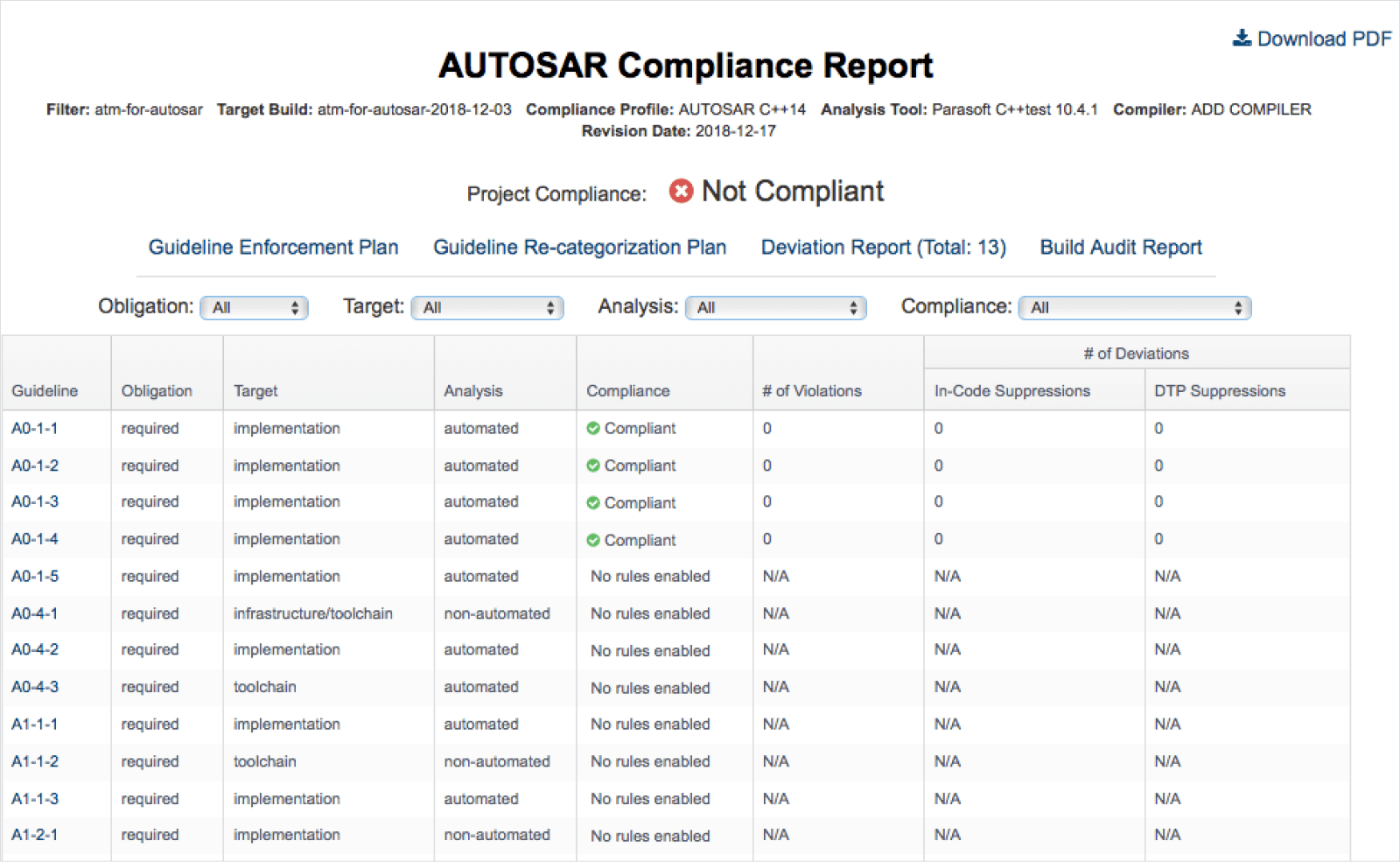Take a faster, smarter path to AI-driven C/C++ test automation. Discover how >>

Explore the Chapters
AUTOSAR (AUTomotive Open System ARchitecture) is a worldwide development partnership of OEM manufacturers, Tier 1 automotive suppliers, semiconductor manufacturers, software suppliers, tool suppliers, and others that focus on establishing and standardizing automotive software architecture.
Adaptive AUTOSAR defines a platform for developing automotive control units, which provide sophisticated functionalities like advanced driving assistance systems, media streaming, or software updates via the internet. The platform contains the specification of interfaces that define services and APIs for building modern automotive systems.
A key component of AUTOSAR Adaptive Platform is AUTOSAR C++14 coding standard that defines guidelines for the use of the modern C++ language in critical and safety-related systems. This is the only standard on the market that supports modern C++. The standard is well documented and provides traceability to the other existing C++ standards, such as HIC++ 4.0, JSF, SEI CERT C++, C++ Core Guidelines, and to MISRA C++ 2008.

In Jan 2019, MISRA consortium announced the integration of AUTOSAR C++14 coding guidelines with MISRA. The MISRA Working Group will continue releasing new C++ industry standards and incorporate the latest version of C++ language, C++ 17, and its successor, C++20, later.
Parasoft C/C++test, a unified testing tool for C/C++ development, and Parasoft DTP, a reporting and analytics dashboard, provide a comprehensive solution to help organizations overcome the challenges associated with automotive software quality and compliance. C/C++test and DTP support AUTOSAR C++14 (19.03) with the most comprehensive coverage of static analysis checkers for the AUTOSAR C++14 guidelines and unique compliance reporting.
AUTOSAR C++14 does not provide explicit guidance on the process of achieving compliance. However, given that AUTOSAR C++14 guidelines are based on MISRA C++ 2008, it’s reasonable to refer to the MISRA compliance guidelines for guidance on achieving compliance.
The desired situation is to have a static analysis tool that covers as many guidelines as possible. The rules that cannot be enforced with static analysis will require manual reviews, which are expensive.
As with MISRA C or C++ compliance, a deviation-handling procedure needs to be established. The deviation procedure formalizes the steps that need to be taken when development needs to deviate from a specific guideline. As MISRA prescribes, it’s expected that “…the procedure will be based around obtaining a sign-off for every deviation or class of deviations.”
This is a particularly important piece of the puzzle. It prevents abusing the deviation concept by developers deviating at will. Effectively, you’ll need formal tickets stored in your system that document every deviation in the source code. The same pertains to the compliance matrix and any additional configurations and process descriptions created to enforce compliance. MISRA C++2008 is truly clear here and requires “formalization within quality system.”
Finally, if all the procedures described in MISRA C++ 2008 point 4.3 are in place for AUTOSAR C++14, we can claim compliance by demonstrating:

AUTOSAR Compliance Report
The only practical way to enforce compliance with a coding standard like AUTOSAR C++14 is with a static analysis tool, like Parasoft C/C++test, a code quality tool supporting multiple testing technologies. Parasoft C/C++test support for AUTOSAR C++14, provides a set of built-in checkers (rules) for verifying compliance with standards including MISRA C 2023, MISRA C++ 2023, MISRA C 2012, MISRA C++ 2008, JSF AV C++, SEI CERT C/C++, HIC++, CWE Top 25, CWE On the Cusp, OWASP, and more.
Parasoft compliance packs provide users with standard specific configurations, automatic generation of compliance documentation, risk assessment framework, and dynamic compliance reporting dashboards (DTP) to help stakeholders easily aggregate, correlate, and apply analytics to centralize reporting for each step along the complex software supply chain.

Parasoft covers 100% of all required and automated AUTOSAR C++14 rules.

Explore the Chapters